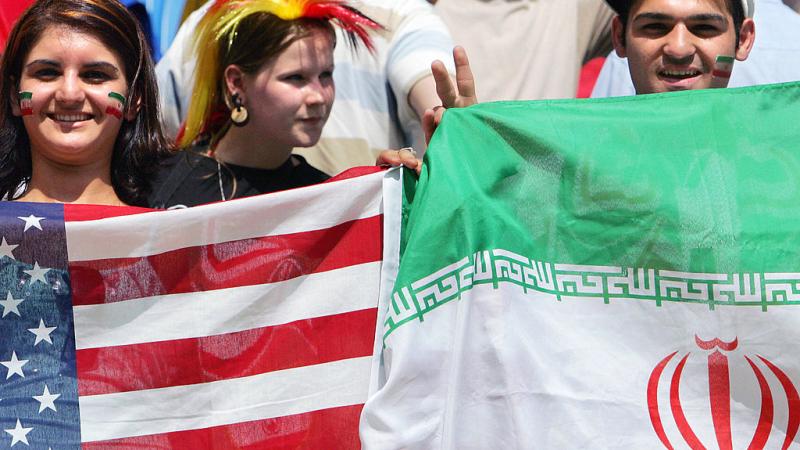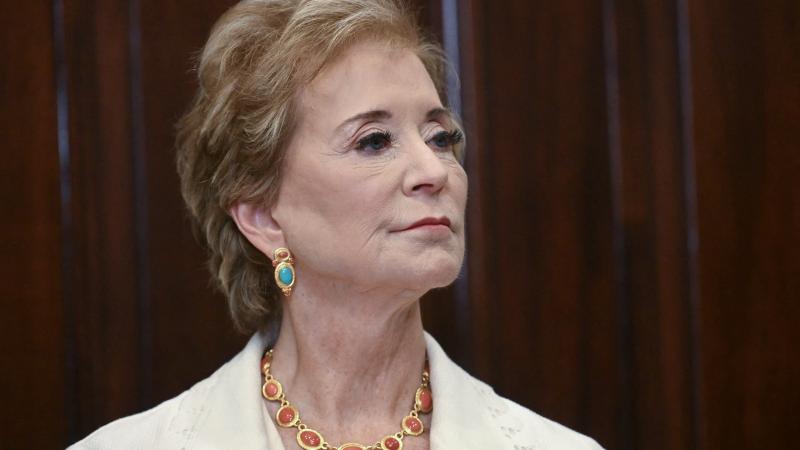Intel community's Sept '16 assessment didn’t say Russia wanted Trump win, that changed after he won
A newly-declassified intelligence assessment shows the IC's stated views on Russian election meddling shifted dramatically after Donald Trump's surprise win in November 2016.
A newly declassified assessment by the U.S. intelligence community from September 2016, obtained by Just the News, showed the IC did not seem overly concerned by Russian meddling in that year's presidential election and made no mention of the Kremlin backing GOP nominee Donald Trump – a tone which would shift dramatically after Trump won the race in November.
The heretofore unknown Intelligence Community Assessment (ICA) – completed in September 2016 but declassified this week by Director of National Intelligence Tulsi Gabbard – stands in stark contrast to the later assessment, which would be completed in December 2016 and made public in January 2017.
“For months preceding the 2016 election, the Intelligence Community shared a consensus view: Russia lacked the intent and capability to hack U.S. elections,” Gabbard tweeted on Friday. “But weeks after President Trump’s historic 2016 victory defeating Hillary Clinton, everything changed.”
The well-known December 2016 assessment from the CIA, the FBI, and the NSA – released publicly in early January 2017 – concluded with “high confidence” that Russian leader Vladimir Putin “ordered an influence campaign in 2016” and that Russia worked to “undermine public faith in the U.S. democratic process, denigrate former Secretary of State [Hillary] Clinton, and harm her electability and potential presidency” and “developed a clear preference for President-elect Trump.” The FBI and CIA also expressed with “high confidence” that Putin had “aspired to help” Trump’s election chances in 2016 by “discrediting” Clinton" and publicly contrasting her unfavorably to him.” The NSA had a “moderate confidence” in this.
But the September 2016 assessment, first obtained by Just the News, made no mention of Russia’s alleged animosity towards Clinton nor of its supposed preference for Trump, included no discussion of the Kremlin allegedly seeking to sink Clinton’s candidacy and elevate Trump’s chances, and generally attributed Russian efforts to a generalized desire to undermine the legitimacy of the U.S. election or the legitimacy of the next presidential administration, rather than a desire to pick a winner and a loser.
The new declassification comes on the heels of the CIA’s recent eight-page “lessons learned” review — released earlier in July — which concluded that “the decision by agency heads to include the Steele Dossier in the ICA ran counter to fundamental tradecraft principles and ultimately undermined the credibility of a key judgment.” The CIA’s recent review also critiqued the “high confidence” assessment by the FBI and the CIA that Putin had “aspired” to help Trump win in 2016.
The ICA from the summer of 2016 — dated Sept. 12, 2016 — was titled “Cyber Threats to the 2016 U.S. Presidential Election” and touched on potential challenges posed by Russia as well as by China, Iran, North Korea, and others. The December 2016 ICA was titled “Assessing Russian Activities and Intentions in Recent U.S. Elections” and focused almost exclusively on the Russians.
“We judge that Russia, China, Iran, and North Korea can execute a variety of disruptive cyber attacks, including data corruption, distributed denial of service, and even data modification on some election infrastructure,” the ICA from September 2016 stated. “We judge Russia has conducted cyber and intelligence operations that suggest that it has potential interest in disrupting the U.S. presidential election. The Kremlin’s cyber penetration of a U.S. political party’s servers and the timing of the probable subsequent leak of stolen data suggest that Russia is motivated to exploit the period surrounding the U.S. presidential election either to try to shape the U.S. political environment or to advance other Russian interests. For example, Putin might simply wish to make the U.S. electoral process appear illegitimate or to undermine the legitimacy of the President-elect, in order to strengthen Moscow’s hand.”
The September 2016 ICA stated that “we assess that foreign adversaries — most notably Russia — probably expect cyber operations against U.S. election infrastructure to be more effective in undermining the legitimacy of the process and the winning candidate than in covertly manipulating the vote outcome.”
The post-election December 2016 ICA was put together by just the CIA, FBI, and NSA — led at the time by Obama CIA Director John Brennan, since-fired FBI Director James Comey, and former NSA director Admiral Mike Rogers — with input from then-Director of National Intelligence James Clapper.
But the pre-election September 2016 ICA was “prepared for the National Intelligence Council (NIC) under the auspices of the National Intelligence Officer (NIO) for Cyber Issues” and was drafted by the NIC, the CIA, and the Department of Homeland Security with “contribution from” the Cyber Threat Intelligence Integration Center, and it was “coordinated with” DHS, FBI, CIA, NSA, the Defense Intelligence Agency, the National Geospatial Intelligence Agency, and the State Department’s Bureau of Intelligence and Research.
“The IC does not know the details of the information stolen during recent Democratic National Committee (DNC) and Democratic Congressional Campaign Committee (DCCC) hacks, but notes that open sources suggest sensitive, election-related, non-public information was obtained,” the September 2016 ICA stated. “We assess that Russian intelligence services were behind the compromises of the DNC and DCCC networks and of email accounts from members of Congress, state political parties, a voter registration organization, and seven other U.S. political organizations.”
The September 2016 ICA stated that “we assess that the Russian services probably orchestrated at least some of the disclosures of DNC and DCCC documents from June to August” but that the “FBI and NSA, however, have low confidence in the attribution of the data leaks to Russia.” The assessment from September 2016 added that “the Kremlin probably expects that publicity surrounding the leaked party data will raise questions about the integrity of the U.S. political process, as Putin hinted in a recent interview.”
At no point did the September 2016 ICA hint that Putin was acting to hurt Clinton’s election chances or to help Trump win the presidency.
As the election drew closer, DHS and ODNI released an early October 2016 joint public statement arguing that “the U.S. Intelligence Community is confident that the Russian Government directed the recent compromises of e-mails from U.S. persons and institutions, including from U.S. political organizations” and that “the recent disclosures of alleged hacked e-mails … are consistent with the methods and motivations of Russian-directed efforts.” DHS and ODNI said that “these thefts and disclosures are intended to interfere with the U.S. election process.”
The statement by DHS and ODNI similarly did not claim the efforts were aimed at helping Trump win and making Clinton lose.
Leaks just before and just after the election indicated that the U.S. intelligence community had not yet come to an alleged agreement that Russia had tried to help Trump win and make Trump lose.
The New York Times had reported on Halloween 2016 that “law enforcement officials say that none of the investigations so far have found any conclusive or direct link between Mr. Trump and the Russian government” and that “even the hacking into Democratic emails, FBI and intelligence officials now believe, was aimed at disrupting the presidential election rather than electing Mr. Trump.”
The Washington Post reported in early December 2016 that “the FBI is not sold on the idea that Russia had a particular aim in its meddling” and quoted a U.S. official who said that “there’s no question that [the Russian] efforts went one way, but it’s not clear that they have a specific goal or mix of related goals.”
The ICA completed in December 2016 and released in early January 2017 stated that “we assess” Putin “ordered an influence campaign in 2016 aimed at the U.S. presidential election” and that “Russia’s goals were to undermine public faith in the U.S. democratic process, denigrate Secretary Clinton, and harm her electability and potential presidency” and that “we further assess Putin and the Russian Government developed a clear preference for President-elect Trump.”
NSA chief Rogers diverged from Brennan and Comey on one key aspect, expressing only “moderate confidence” rather than “high confidence” that Putin had “aspired to help” Trump’s election chances in 2016 by “discrediting” Clinton" and publicly contrasting her unfavorably to him.”
The recent CIA review stated that “NSA and a few other participants were not comfortable with ascribing ‘high confidence’ to the ‘aspired’ judgment. They cited the limited source base, lack of corroborating intelligence, and ‘the possibility for an alternative judgment’ as driving their discomfort.”
“I wouldn’t call it a discrepancy. I’d call it an honest difference of opinion between three different organizations, and in the end, I made that call,” Rogers told the Senate in 2017. “When I looked at all of the available data, I was struck by, for every other key judgment in the report, I had multiple sources, multiple disciplines, and I was able to remove almost every other alternative rationale that I could come up with in my mind for, well, could there be another reason to explain this. In the case of that one particular point, it didn’t have the same level of sourcing and the same level of multiple sources from different perspectives."
The publicly-available version of the December 2016 ICA stated that “further intelligence has come to light since Election Day that, when combined with Russian behavior since early November 2016, increase our confidence in our assessments of Russian motivations and goals.” And a further declassified version of the December 2016 ICA, also obtained by Just the News, also stated that “CIA and FBI have high confidence in this judgment” that Putin “aspired” to help Trump win — “based on sensitive information not included in this version of the assessment.”
A senior intelligence official told Just the News that those two passages were referencing two main pieces of information — a secret source closely-held by Brennan, and the anti-Trump dossier put together by British ex-spy Christopher Steele.
Comey and former FBI Deputy Director Andrew McCabe had pushed in December 2016 to include British ex-spy Christopher Steele's debunked dossier in the 2016 ICA on alleged Russian meddling. The recent CIA review also sharply criticized Brennan for allegedly joining with these anti-Trump forces in the FBI in pushing to include Steele’s baseless anti-Trump dossier in the assessment.
The Senate Intelligence Committee released a bipartisan report in 2020 defending the 2016 ICA. The panel said congressional investigators found no evidence of political pressure and determined the assessment “presents a coherent and well-constructed intelligence basis for the case of unprecedented Russian interference.” The senators also found that “the differing confidence levels on one analytic judgment are justified and properly represented.”
The only direct mention of the ICA in special counsel John Durham’s report was to praise prior “careful examinations” such as the Senate Intelligence Committee’s 2020 report on Russia.
The Senate findings clashed with a 2018 report from the GOP-led House Intelligence Committee, chaired at the time by then-Rep. Devin Nunes (R-Calif.), which concluded that “the majority of the Intelligence Community Assessment judgments on Russia’s election activities employed proper analytic tradecraft” but the “judgments on Putin’s strategic intentions did not.” The House report said it “identified significant intelligence tradecraft failings that undermine confidence in the ICA judgments regarding Putin’s strategic objectives.”
The Democrats on the panel, led by then-ranking member Rep. Adam Schiff, D-Calif., released their own report, saying that they “found no evidence that calls into question the quality and reliability of the ICA’s … assessment about President Putin’s desire to help candidate Trump.”
The GOP-led House Intelligence Committee’s classified findings on the 2016 ICA have been closely held by the CIA since 2018, although Ratcliffe handed the still-classified House Intelligence Committee report back over to the committee earlier this month.
Rep. Rick Crawford, R-Ark., the current chairman of the House Intelligence Committee, sent Trump a letter this month telling him that a still-classified 2018 report by the committee “exposes the truth about the politically driven Obama-era assessment.”
Crawford urged Trump to read the classified report and argued in his letter that “public interest declassification is merited.”
The Facts Inside Our Reporter's Notebook
Links
- assessment
- tweeted
- concluded
- first obtained
- eight-page âlessons learnedâ review
- released
- reported
- reported
- stated
- NSA
- Rogers
- stated
- told
- publicly-available version
- obtained
- former FBI Deputy Director Andrew McCabe
- baseless anti-Trump dossier
- bipartisan report
- only direct mention
- concluded
- report
- handed
- sent Trump a letter













